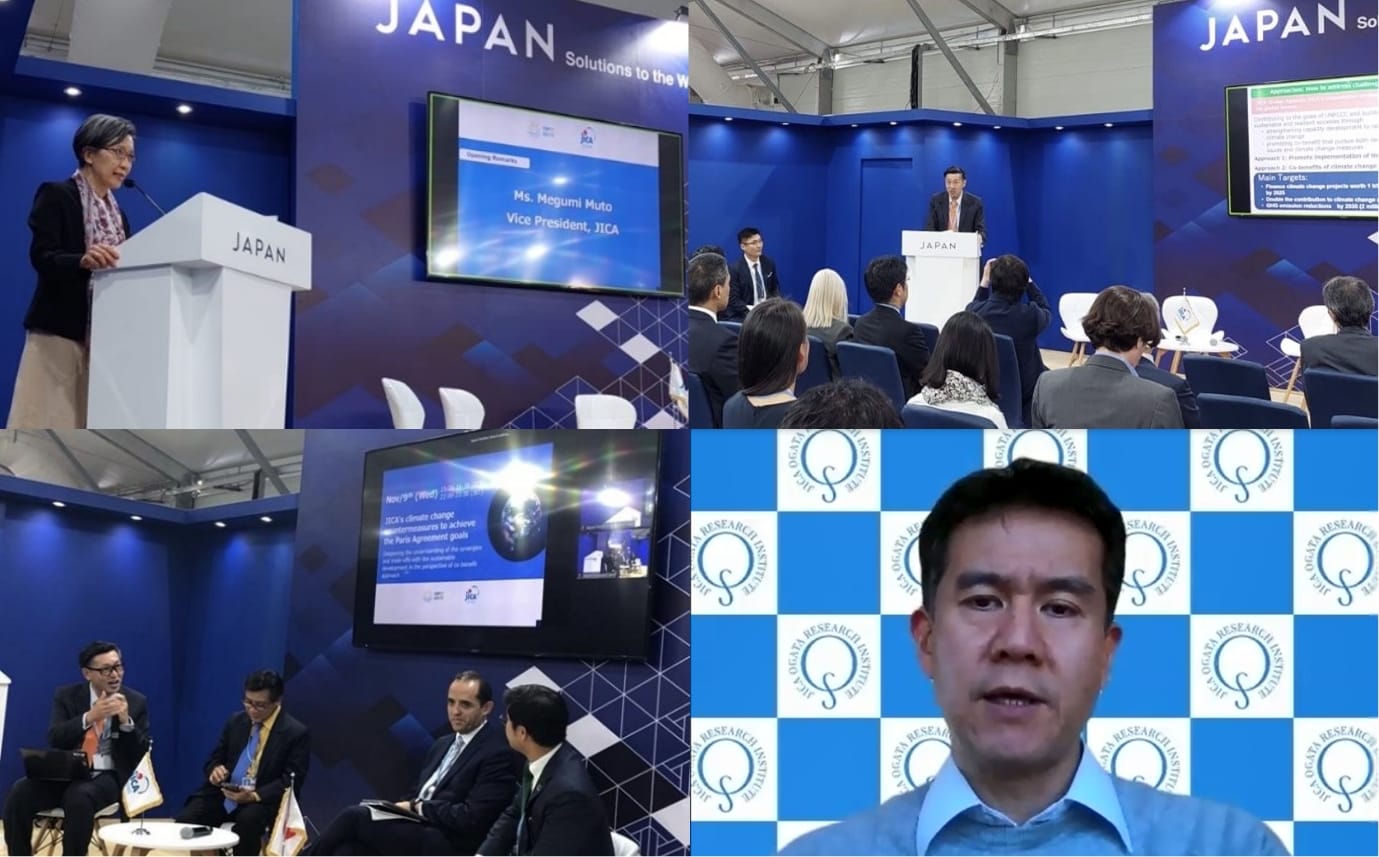2022.11.9 WED
- 15:00 - 16:30
- JICA's climate change countermeasures to achieve the Paris Agreement goals. Deepening the understanding of the synergies and trade-offs with the sustainable development in the perspective of co-benefit approach.
- Organizer
- Japan International Cooperation Agency(JICA)
- Seminar abstract
- The IPCC report (AR6) emphasizes the need to build resilient societies along with global efforts to reduce greenhouse gases due to the social and economic threats posed by climate change. It is also important for countries around the world to step up their efforts to achieve the Paris Agreement. Under these circumstances, JICA formulated a Global Agenda for Climate Change (GA) (June 2021) which has at its core to promote the implementation of the Paris Agreement and the co-benefit approach to promote climate change countermeasures in development projects with concrete targets. In addition, JICA's fifth medium-term plan (2022-2026), which started in April 2022, also places climate change countermeasures as a priority issue. This side event will introduce the efforts of developing countries and JICA to achieve the Paris Agreement from the perspective of JICA's GA, especially on co-benefits measures and discuss effective approaches to climate change countermeasures. It also aims to deepen understanding of the trade-offs between development and climate change measures.
Live-streaming: https://forms.office.com/r/xVbgPq2yQK
*Depending on local network conditions, it may not be possible to distribute the streaming
- Speakers
- 【Local Speakers】
- Ms. Megumi MUTO(Japan International Cooperation Agency) Vice President
- Mr. Akihiro MIYAZAKI(Japan International Cooperation Agency Global Environment Department) Deputy Director General
- Mr. Pornphrom Vikitsreth(Bangkok Metropolitan Administration (BMA) ) Adviser to the Governor of Bangkok
- Dr. Medrilzam(Ministry of National Development Planning/National Development Planning Agency (BAPPENAS) ) Director for Environmental Affairs
- Mr. Ahmed Al Qabany(World Bank, Climate Change Group, Climate Change Advisory and Operations Unit,) Senior Climate Change Specialist
【Online Speakers】- Mr. Ichiro SATO (Japan International Cooperation Agency Ogata Sadako Research Institute for Peace and Development) Executive Senior Research Fellow
- Session Summary
-
The event introduced developing countrie’s and JICA’s efforts to achieve the Paris Agreement from the perspective of JICA’s Global Agenda (GA), especially co-benefit climate change measures, and deepened the discussion on effective approaches to climate change counter measures and the trade-offs between development and climate change measures.
Ms. Megumi Muto, JICA Vice President, began the session by stating that JICA is involved in many programs that focus on the transition to a resilient society, such as the Long-Term Strategy on Climate Change, Energy and Transportation Impact Mitigation Plan of Climate Change, and appealed for the need to involve not only ministries directly dealing with climate change but also those involved in energy, transportation, agriculture, forestry, and fisheries sectors.
Next, Mr. Akihiro Miyazaki, Deputy Director General of JICA’s Global Environment Department, stated that JICA’s co-benefit approach aim to maximize synergies of sustainable development and climate change action, with an integrated and inclusive approach to avoid or minimize potential trade-offs. He cited the case of the Cairo Metro project that contributed to reduce CO2 emissions together with public transportation improvement, and the substantial reduction of typhoon damage in the Philippines through grant aid and technical assistance that anticipated disaster risks.
Dr. Medrilzam, Director of Environment Affairs of BAPPENAS Indonesia, presented the projected damage caused by climate change in his country and the “Climate Resilient Development Strategy” included in the National Mid-term Plan (2020-2024). The strategy identifies ocean and coastal regions, water resources, agriculture, and health as the four priorities areas, and defines the core activities, expected outcomes, and who will implement them in each area, and said that the government hopes to promote an integrated approach to implement these activities with funding and cooperation from other countries.
Mr. Vikitsreth, Advisor to the Governor of Bangkok Metropolitan Administration (BMA) explained that under the Governor’s top-priority vision of “a livable city,” the Bangkok Metropolitan Administration (BMA) will promote number of mitigation activities such as the use of public buses and bicycles, electric vehicles, solar power, and improved waste management, along with the introduction of trains as public transporataion.
Ichiro Sato, Executive Senior Research Fellow at JICA’s Sadako Ogata Peace and Development Institute, discussed an irrigation development project in Kenya and introduced the results of a study that evaluated the impact and effectiveness of projects planned under the uncertainty of climate change.
During the panel discussion, the importance of enhancing synergies and avoiding impacts on SDGs when taking climate actions were discussed. Ahmed Al Qabany, Senior Climate Change Specialist, Climate Change Advisory Operations Unit, Climate Change Action Group, World Bank, also stressed that reliable information is needed to fully integrate climate change and development issues.
Other timetable
2022.11.9 WED
- 10:30 - 12:00
-
Financing a just and orderly transition - Filling the gaps to pave the way to a credible transition path
MUFG Bank, Ltd.
- 13:00 - 14:30
-
Mobilizing Finance to Facilitate Energy Transition and Decarbonization in ASEAN
Ministry of Economy, Trade and Industry
- 17:00 - 18:30
-
How can businesses accelerate the zero carbon transition in Japan?
Japan Climate Leaders’ Partnership
- 19:00 - 20:30
-
New Roles of the Chemical Industry toward Carbon Neutrality by 2050
The University of Tokyo
